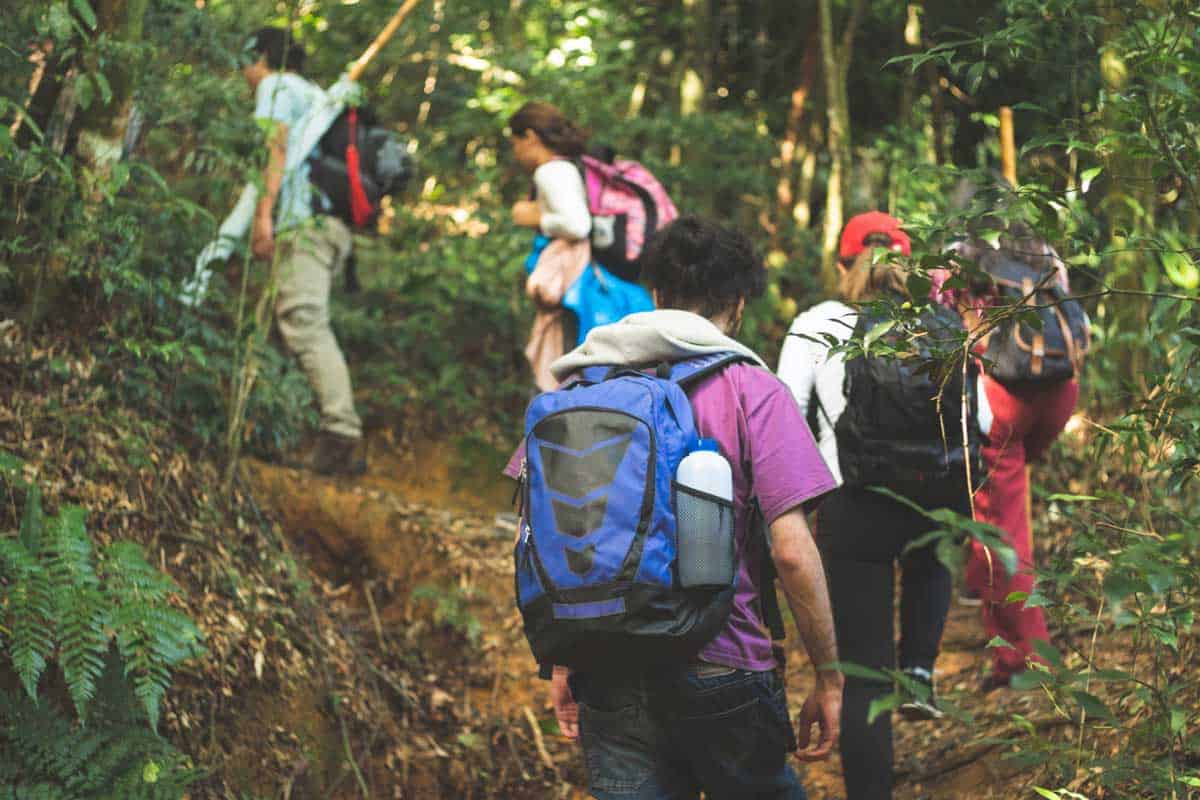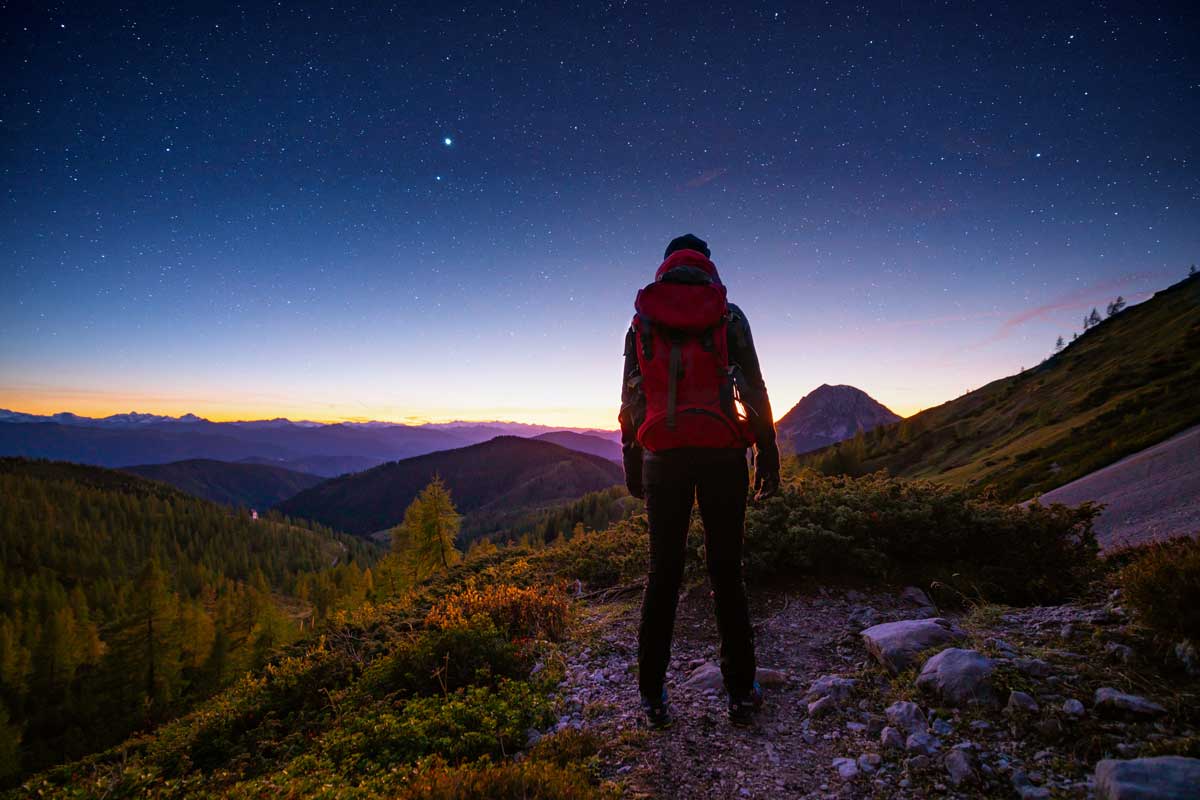If you've ever been hiking, you know that it's not as easy as it looks. Perhaps you were even turned off to hiking in general from a bad experience where you became overly fatigued out on the trail. Surely there are ways to hike without getting tired, right? As it turns out, there are, and we've done the research to show you how you can hike without getting so tired.
To stave off fatigue while hiking, follow these 7 tips:
- Get in shape with some cardio exercise
- Get proper footwear
- Dress for the environment
- Drink plenty of water before and during the hike
- Bring some snacks
- Pace yourself
- Use a walking stick
If you still have some questions about preventing fatigue while hiking, don't worry. In this guide, we'll discuss the tips mentioned above in greater detail, and we'll answer any additional questions you may have. Just keep reading!
![Hiker woman with trekking sticks climbs steep on mountain trail, focus on boot, How To Hike Without Getting Tired [7 Crucial Tips!]](https://fitseer.com/wp-content/uploads/2020/09/How-To-Hike-Without-Getting-Tired-7-Crucial-Tips.jpg)
Avoiding Fatigue While Hiking
Here we'll talk in more detail about how you can avoid getting tired out on the trail.
1. Get In Shape With Some Cardio Exercise
The key to avoiding fatigue while hiking is to be in good shape, namely as it pertains to the cardiovascular system. Hiking is essentially walking on steroids, and as such, it requires a strong heart that can efficiently pump oxygen-rich blood throughout your body.
Cardiovascular conditioning is even more important if you plan on hiking at higher altitudes. As altitude increases, the amount of oxygen in the air decreases, which means your body will succumb to fatigue much faster than it would closer to sea level.
How Do I Get In Shape For Hiking?
The best way to improve your hiking stamina is to do regular workouts that target your cardiovascular system such as walking, running, biking, jump rope, or swimming. Cardio exercise will strengthen your heart and significantly improve your overall physical fitness. Even a moderate amount of cardiovascular exercise will pay dividends out on the trail, as your heart will be better prepared to handle the increased strain.
2. Get Proper Footwear
When it comes to hiking, footwear is key. What you have on your feet can significantly alter the level of fatigue you experience on the trail. When choosing footwear, there are two things to consider: the type of shoe and the fit.
In general, boots are recommended for hiking because they provide maximum protection for your feet.
It's also important to ensure that your hiking boots fit properly. Boots that are too small or too big will cause blisters which will not only decrease your stamina but your morale as well. Check out this helpful video that discusses how hiking boots should fit:
3. Dress For The Environment
The way you dress goes a long way toward determining the level of fatigue experienced out on the trail. Simply put, dress comfortably; the more comfortable you are, the less fatigued you will be.
If you're hiking in a hot environment, wear lighter clothing so you don't overheat. When hiking in colder environments, wear enough clothing to be warm, but remember that your body will heat up once you start hiking.
4. Drink Plenty Of Water Before And During The Hike
The importance of proper hydration for physical fitness can't be overstated. When it comes to hiking, it's critical to hydrate before stepping off and to remain hydrated throughout the hike.
Aim to drink approximately two to four cups of water per hour during a hike depending on the level of energy expenditure. If it's a moderate hike, two cups of water per hour should suffice, but if it's a physically grueling hike, consume closer to four cups of water per hour.
It's worth noting that it's also important to drink water when hiking in cold weather. You might not feel as thirsty in colder climates, but the body's need for water doesn't go away.
One of the best ways to stay hydrated on a hike is to drink some water with dissolved electrolyte powder. In layman's terms, electrolyte powder facilitates rapid hydration by giving the body important vitamins and minerals that help replenish lost water. To avoid fatigue on your next hike, bring a packet of electrolyte powder like this one:
Liquid I.V. Hydration Multiplier
This electrolyte powder provides the body with a specific ratio of potassium, sodium, glucose for optimal hydration and performance. Simply mix one of these electrolyte powder packets into 16 ounces of water for quick hydration.
Click here to see more on Amazon.
5. Bring Some Snacks
Proper nutrition is another great way to avoid getting tired while hiking. Since hiking is such a taxing activity, it's important to replenish the energy that your body expends. Be sure to pack energy-rich foods such as dried fruit, trail mix, or jerky, and snack periodically throughout the hike.
6. Pace Yourself
Maintaining a good pace will help you avoid getting tired on the hiking trail. One of the surefire ways to become fatigued while hiking is to start off at a fast pace that your body can't maintain. To avoid this, start the hike at a slow pace and gradually speed up until you reach a pace you can maintain for the duration of the hike.
The Nike Run Club app is a great way to monitor your pace on the trail. While the app is specifically geared toward running, it's perfect for keeping a close eye on your hiking pace. The app clearly displays your pace, so you can speed up or slow down to maintain your goal pace.
7. Use A Walking Stick
![Hiker woman with trekking sticks climbs steep on mountain trail, focus on boot, How To Hike Without Getting Tired [7 Crucial Tips!]](https://fitseer.com/wp-content/uploads/2020/09/Hiker-woman-with-trekking-sticks-climbs-steep-on-mountain-trail-focus-on-boot.jpg)
A walking stick is an excellent tool that makes it significantly easier to traverse rugged terrain. Walking sticks improve stability when hiking, and they reduce the strain associated with climbing uphill. A sturdy stick from the woods will suffice as a walking stick, but if you want something more permanent and durable, consider these:
TrailBuddy Adjustable Trekking Poles
These adjustable hiking poles are made out of 7075 aluminum, so they'll be durable yet lightweight. They are also easy to adjust, even when wearing gloves. And lastly, these walking sticks come in eight different color options, so you can choose the color that best suits you.
Click here to see more on Amazon.
Why Does Hiking Make Me So Tired?

As mentioned, hiking is extremely taxing on the body. Many hiking trails span several miles across rugged terrain, so hiking is certainly a workout. As such, it's perfectly normal to feel somewhat drained after a long hike.
However, if you feel completely zapped each time you hike, you're probably doing something that goes against the tips we discussed earlier. If you heed the tips mentioned, you should see a significant reduction in fatigue next time you hit the trail.
What Is The Best Way To Breathe While Hiking?
Using proper breathing techniques can significantly improve your stamina while hiking. Remember the emphasis placed on proper cardiovascular conditioning earlier? Proper breathing technique goes hand-in-hand with cardiovascular endurance.
To keep it simple, there are two things to focus on when it comes to breathing: breathing through your mouth and maintaining good posture.
Breathing through the mouth allows you to inhale more air and thus provide your body with much-needed oxygen. The only time you might consider breathing through your nose rather than your mouth is in hot environments; in these climates, breathing through your nose will prevent your mouth from drying out.
Maintaining an upright posture is another way to make breathing easier and thus prevent fatigue. When the body is upright, the lungs have more room to expand which means the body will get more oxygen per breath.
Check out this video that discusses breathing techniques for hiking in greater detail:
https://www.youtube.com/watch?time_continue=20&v=06Xd_GcRQYk&feature=emb_logo
In Closing

We hope this guide has helped you learn how you can avoid fatigue while you're out on the trail. If you follow these simple tips, you'll be well on your way to conquering any trail!




![Read more about the article Best Paint For Basketball Court Lines [Outdoor And Indoor]](https://fitseer.com/wp-content/uploads/2022/05/blue-background-of-newly-made-outdoor-basketball-court-in-park-500x333.jpg)

![Read more about the article How Much Does It Cost to Go Bowling? [and Should You Buy Your Own Gear]](https://fitseer.com/wp-content/uploads/2020/10/Close-up-view-score-monitor-in-bowling-club-500x333.jpg)

![Read more about the article Do Football Gloves Stretch With Use? [And How To Stretch Them Faster]](https://fitseer.com/wp-content/uploads/2022/04/Football-players-trying-to-catch-the-ball-500x333.jpg)